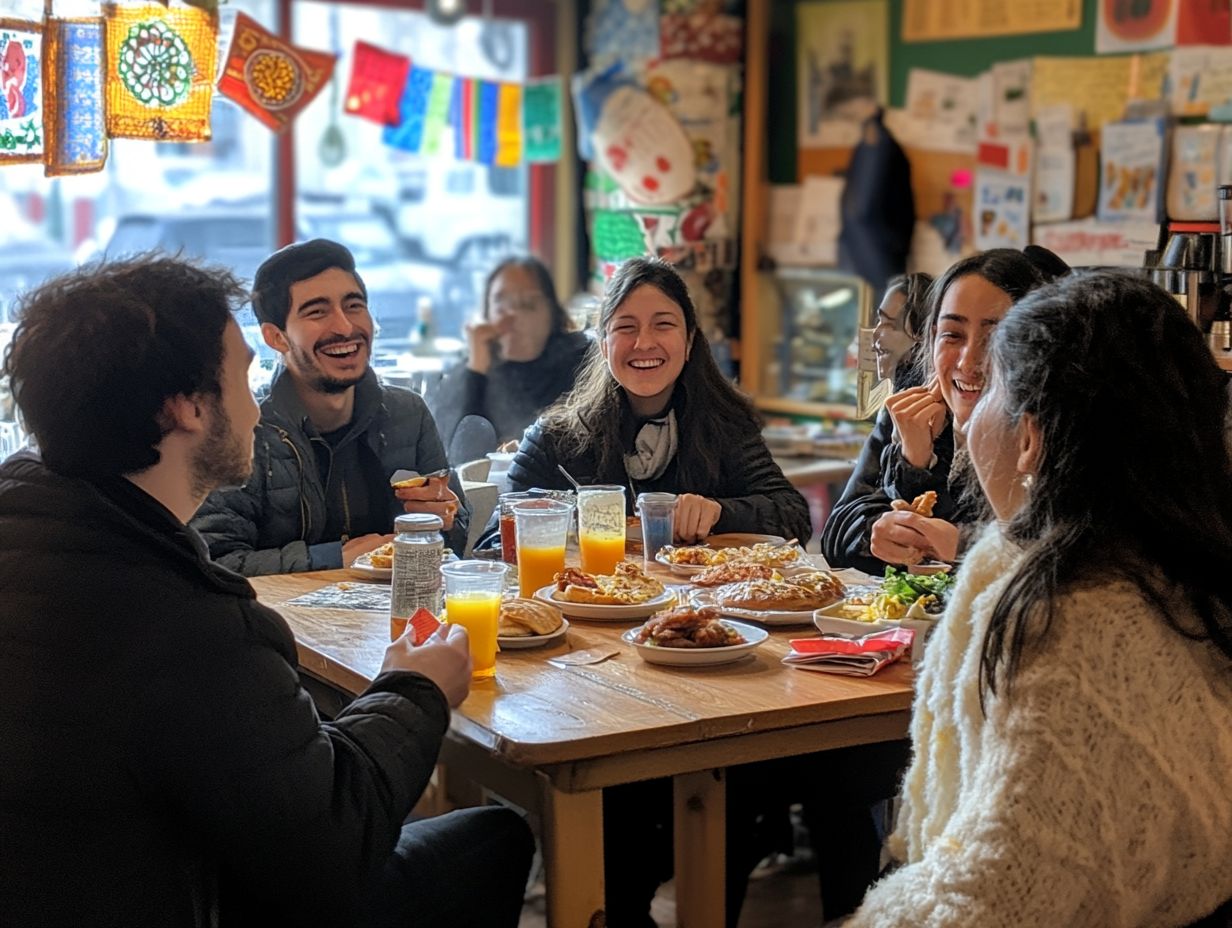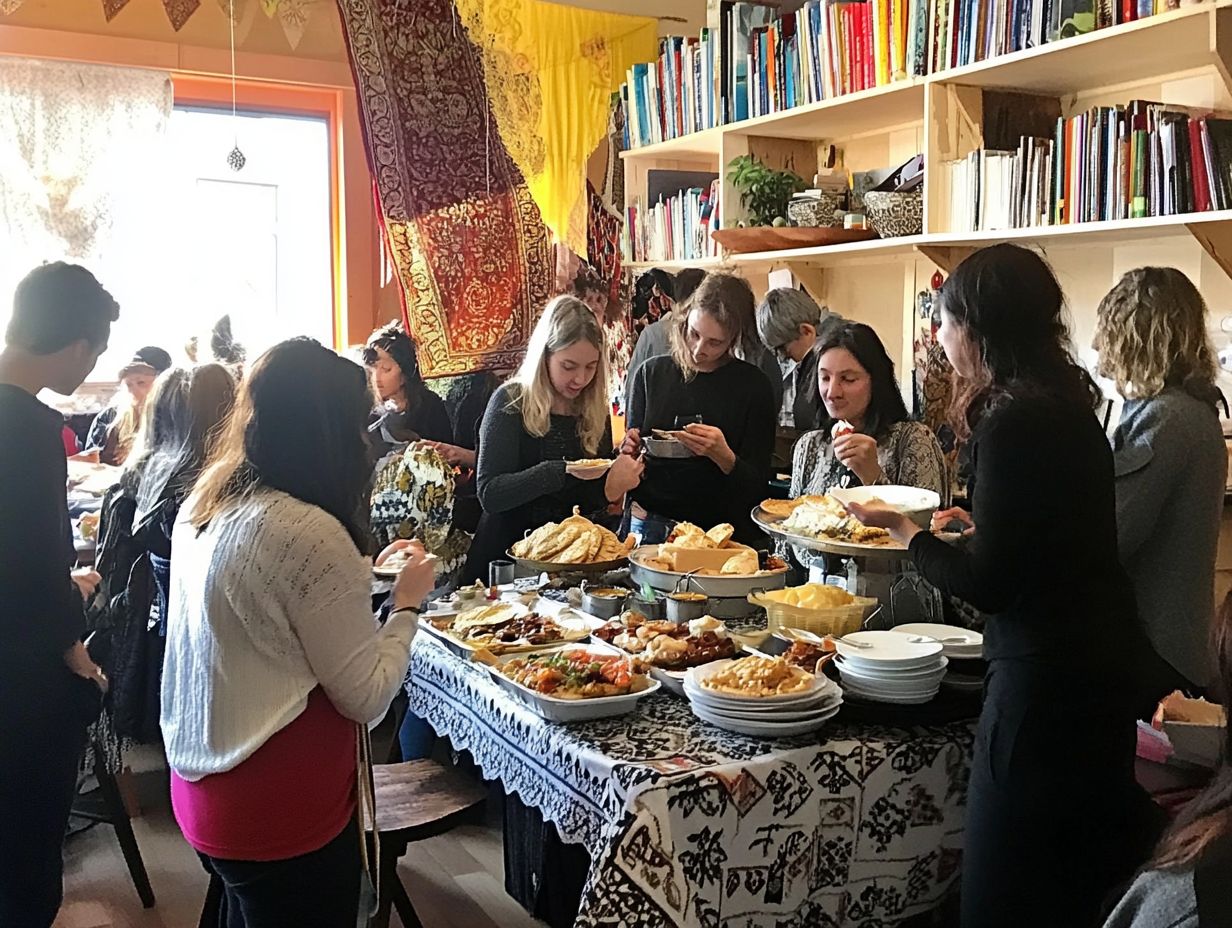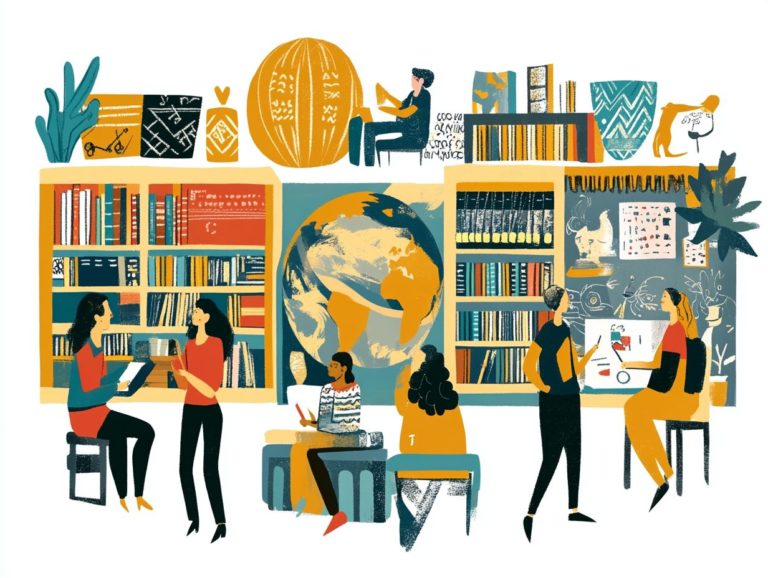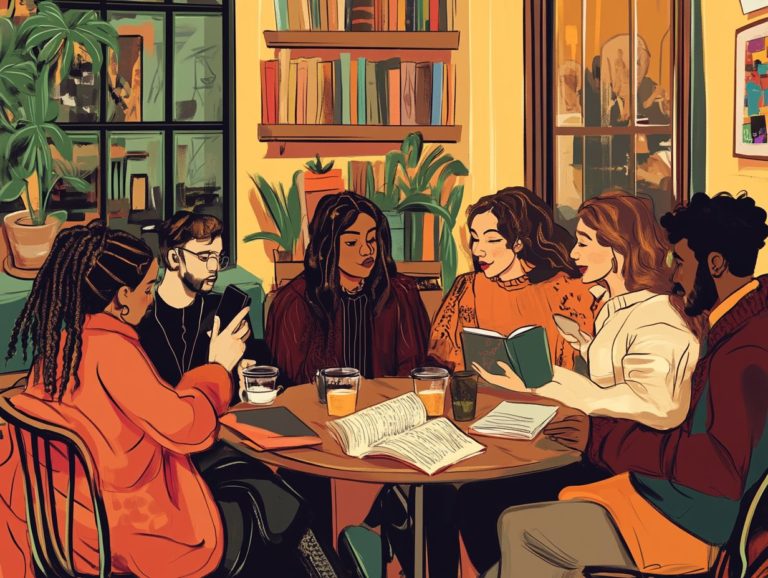7 ways to engage with local culture for language learning
Engaging with local culture transforms your language learning journey. By getting involved in the everyday lives and traditions of native speakers, you enhance your linguistic skills and gain a profound understanding of the context in which the language thrives.
This article explores seven enriching ways to connect with local culture, from participating in vibrant festivals to joining language exchange programs. Discover how these experiences can elevate your language mastery and create lasting memories.
Contents
- Key Takeaways:
- 1. Participate in Cultural Events and Festivals
- 2. Join a Local Language Exchange Program
- 3. Volunteer in the Community
- 4. Take Part in Traditional Activities
- 5. Attend Cultural Workshops and Classes
- 6. Stay with a Host Family
- 7. Explore Local Markets and Shops
- Why Is It Important to Engage with Local Culture for Language Learning?
- What Are the Benefits of Immersing Yourself in the Local Culture?
- How Can Engaging with Local Culture Enhance Your Language Learning Experience?
- What Are Some Challenges You May Face When Engaging with Local Culture for Language Learning?
- How Can You Overcome These Challenges?
- What Are Some Tips for Making the Most Out of Your Cultural Immersion Experience?
- Frequently Asked Questions
- What are the benefits of engaging with local culture for language learning?
- What are some ways to engage with local culture for language learning?
- How can attending cultural events and festivals help with language learning?
- Why is joining a language exchange program beneficial for language learning?
- What are the advantages of volunteering in the community for language learning?
- How does exploring local cuisine contribute to language learning?
Key Takeaways:

Participating in cultural events and festivals immerses you in local culture and provides opportunities to practice your language skills.
Joining a language exchange program allows for practice with native speakers and cultural exchange.
Volunteering in the community not only gives back, but also allows for immersion in local culture and practicing language skills.
1. Participate in Cultural Events and Festivals
Participating in cultural events and festivals is essential for immersing yourself in the local culture. These occasions offer unique opportunities to engage with community members and experience their customs firsthand.
Such experiences enable meaningful interactions with native speakers. Can you picture lively parades that showcase colorful costumes or traditional festivals celebrating harvests? Each event serves as a gateway into the heart of the community.
These gatherings often feature local artisans, food vendors, and performers whose talents reflect age-old practices. You’ll not only witness unique customs; you’ll join in dances, taste authentic dishes, and celebrate local narratives. This creates a rich linguistic landscape.
This kind of engagement nurtures friendships and fosters cultural exchange, forging bonds that often extend beyond the event. It enhances your language acquisition journey while deepening your appreciation for the community’s heritage.
2. Join a Local Language Exchange Program
Joining a local language exchange program sharpens your language skills while immersing you in the culture of native speakers. This experience enhances your fluency and fosters a sense of community.
These programs provide the perfect setting for practical language application, allowing you to engage in real-life conversations that elevate your proficiency. As you participate, you’ll benefit from the diverse cultural perspectives exchanged during discussions.
To get involved, start by:
- Searching online for local meet-ups
- Checking community centers
- Exploring social media groups dedicated to language learning
By actively engaging in these settings, you maximize your opportunities for learning and connection.
3. Volunteer in the Community
Volunteering in the community connects you with locals and immerses you in cultural practices. This experience enriches your language learning and personal journey.
You can choose from various volunteer opportunities, like teaching English or assisting with environmental conservation, allowing you to engage deeply with local customs.
These experiences enhance your understanding of the community while cultivating essential skills. Volunteering encourages patience and understanding qualities crucial for navigating cultural differences and building trust.
Through these engagements, you contribute meaningfully and return home with unforgettable memories and a broader worldview.
4. Take Part in Traditional Activities
Engaging in traditional activities offers you an authentic glimpse into the local culture, allowing you to experience the customs and practices that shape the community’s identity. This deepens your understanding of the language and its context.
Join local dance classes or cooking sessions! You’ll create lasting memories as you connect with wonderful people. By participating in local dance, craft-making, or cooking classes, you immerse yourself in the vibrant customs while creating memorable interactions that foster genuine connections with local people.
Learning traditional dance steps can dissolve barriers, and crafting or cooking together becomes a delightful, interactive way to practice with native speakers. This hands-on approach not only bridges the culture shock gap but also enriches your travel experience, empowering you to navigate language challenges with newfound confidence all while sharing joyful moments of creation and connection.
5. Attend Cultural Workshops and Classes

Attending cultural workshops and classes serves as an invaluable opportunity for you to immerse yourself in local customs while enhancing your language skills through organized conversations and hands-on experiences with community members.
Workshops include culinary classes and art sessions that invite you to explore local techniques in painting, pottery, or textile design. You not only acquire new skills but also cultivate connections through shared activities.
By integrating feedback and observations during these sessions, you create a collaborative learning environment where you can reflect on your progress and discuss experiences openly. This approach enriches your understanding of cultural nuances and elevates your language proficiency to new heights.
6. Stay with a Host Family
Staying with a host family is an incredible chance to dive deep into the local culture and improve your language skills. It immerses you in an environment where you can discover daily customs and form meaningful connections with locals who offer invaluable insights into their culture.
In this enriching atmosphere, you become more than just a visitor; you re woven into the fabric of their daily life, fostering a deeper understanding and appreciation. Daily language practice flows naturally as you navigate conversations around the dinner table, share stories, or even lend a hand with household chores.
Maximize this opportunity by interacting with curiosity. Ask questions, share your own experiences, and fully engage in cultural traditions. Remember, cultivating respect and exercising patience will help bridge any initial differences, allowing you and your host family to create lasting memories and invaluable exchanges.
7. Explore Local Markets and Shops
Don’t miss out on exploring local markets and shops! They are perfect for immersing yourself in daily life and customs while providing an excellent opportunity for language practice through interactions with the locals. This fosters a profound understanding of the community s culture.
Every visit offers unique encounters that make your trip unforgettable. From bustling farmers’ markets overflowing with fresh produce to charming artisan shops brimming with handmade crafts, local vendors are often eager to share their stories, offering you insights into their traditions and practices that elevate your experience.
Engaging with these merchants gives you invaluable context as you navigate regional dialects and colloquialisms in a real-world setting. Observing how locals negotiate prices or exchange recipes can spark conversations that sharpen your language skills while building connections that go beyond typical tourism.
These exchanges contribute not only to your personal growth but also illuminate the vibrant tapestry of local culture.
Why Is It Important to Engage with Local Culture for Language Learning?
Engaging with local culture is essential for your language learning journey. It provides you with immersive experiences that enrich your understanding of the language’s context, structure, and nuances. To further enhance your efforts, consider exploring 7 ways to integrate language learning into daily life, ultimately leading to more effective communication and deeper connections within the community.
This involvement encourages you to grasp not just vocabulary and grammar but also the finer subtleties present in everyday conversations.
For instance, when you participate in traditional festivals, you have the opportunity to observe and understand various dialects and expressions tied to cultural practices. When native speakers weave humor, gestures, or specific idioms into their speech, being attuned to these cultural elements helps you decode meanings that might otherwise slip through the cracks.
Exploring culinary traditions allows you to learn food-related vocabulary while engaging in vibrant discussions about local ingredients and cooking methods. This deepens your linguistic competence and enriches your appreciation of the culture itself.
What Are the Benefits of Immersing Yourself in the Local Culture?
Immersing yourself in the local culture comes with a lot of benefits. From sharpening your language skills to enriching your experiences and gaining a profound understanding of community dynamics, these benefits can elevate your travel escapades to new heights.
When you engage with native speakers, you ll likely notice your language proficiency skyrocketing. Authentic conversations will push you to think on your feet, making every interaction a learning opportunity.
For example, ordering food at a lively market is a crash course in invaluable phrases and pronunciation nuances that typical textbooks just can t capture.
Exposure to diverse customs and traditions nurtures personal growth, expanding your worldview and fostering empathy. By diving into local festivals or communal activities, you gain a genuine appreciation for various cultural expressions and forge meaningful friendships with residents.
These connections create lasting memories and a network that beautifully transcends borders.
How Can Engaging with Local Culture Enhance Your Language Learning Experience?

Engaging with local culture enhances your language learning experience by providing opportunities for real-world application of your language skills, fostering authentic interactions with native speakers, and offering valuable context through cultural insights. To make the process even more enjoyable, consider exploring 7 ways to make language learning fun.
This immersive approach transforms the learning process into an enjoyable adventure. It encourages you to practice speaking and comprehension in genuine scenarios, like ordering delicious food at a local restaurant or joining community events.
As you adapt to different communication styles across various cultural settings, you ll begin to grasp the subtle nuances, idioms, and expressions that textbooks often leave out.
For instance, understanding the importance of a casual greeting in one culture compared to a formal introduction in another can significantly boost your fluency and confidence.
These diverse interactions lead to a richer comprehension of the language, setting the stage for enhanced proficiency as you navigate the linguistic landscape with ease.
What Are Some Challenges You May Face When Engaging with Local Culture for Language Learning?
Engaging with local culture while learning a language can indeed throw a few curveballs your way. Challenges like culture shock, communication barriers with native speakers, and the risk of misinterpreting customs can arise.
When you encounter different communication styles, you sharpen your ability to read non-verbal cues and adapt your own methods. Navigating cultural norms enhances your understanding and cultivates a genuine appreciation for diversity, fostering empathy and open-mindedness.
Embrace these challenges! They will not only push you past discomfort but also build resilience.
In this sense, every hurdle you face can become a stepping stone toward greater language proficiency and cultural fluency.
So, why wait? Start engaging with the local culture today and ignite your language learning journey!
How Can You Overcome These Challenges?
Overcoming challenges when experiencing local culture demands a proactive approach. Seek feedback, practice patience, and embrace the learning process as a key component of your journey.
To navigate these challenges, seek local advice and insights. This broadens your understanding and helps you forge connections with community members.
Maintaining an open mindset is crucial. It allows you to adapt flexibly to new customs and practices. Leverage various media resources local news outlets, blogs, or social media to gain valuable context that can enrich your experience.
Building relationships with locals will significantly ease your transitions. Trust and camaraderie often open the door to deeper engagement and acceptance.
What Are Some Tips for Making the Most Out of Your Cultural Immersion Experience?
Maximizing your experience means diving headfirst into local customs, engaging in meaningful conversations, and embracing new perspectives. Hone your language skills in real-world contexts.
To truly enrich this journey, consider attending local events such as festivals, workshops, and markets. Authentic interactions unfold naturally in these settings.
Keeping a language journal can be a game-changer. Document new vocabulary and expressions, making it easier to track your personal progress.
Embrace technology language learning apps and social media platforms can open doors for practice and connection with native speakers.
Above all, engage with community members respectfully. Show genuine interest and appreciation for their culture. This approach fosters deeper relationships and elevates your entire experience.
Frequently Asked Questions
What are the benefits of engaging with local culture for language learning?

Diving into local culture supercharges your language learning journey! It allows for practical application and immersion, providing a deeper understanding of the language’s nuances and cultural context.
What are some ways to engage with local culture for language learning?
- Attend cultural events and festivals
- Join a language exchange program
- Volunteer in the community
- Explore local cuisine and try traditional dishes
- Visit historical and cultural sites
- Join local clubs or organizations
- Learn traditional dances or participate in cultural activities
How can attending cultural events and festivals help with language learning?
Attending cultural events and festivals immerses you in the language, allowing for real-life practice. By doing so, you can observe and learn about local customs, traditions, and expressions, which is how to explore cultural heritage through language learning.
Why is joining a language exchange program beneficial for language learning?
A language exchange program pairs you with a native speaker who wants to learn your language. This creates a mutually beneficial learning experience, allowing practice in a natural and conversational setting while gaining insight into local culture.
What are the advantages of volunteering in the community for language learning?
Volunteering provides opportunities to practice the language and allows for meaningful interactions with locals. You’ll gain a deeper understanding of their culture and way of life.
How does exploring local cuisine contribute to language learning?
Food is an essential part of culture. Trying traditional dishes exposes you to new vocabulary and customs, while also providing opportunities to interact with locals and practice speaking in a natural setting.
Start your journey today get involved in a local event!




